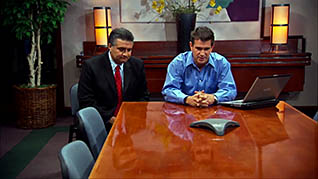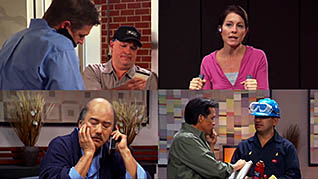How to Overcome Unproductive Meetings
For many, making their workplace more productive and efficient is a great concern. Many businesses are dealing with less staff charged with more responsibilities, along with the looming pressure from upper management. While fighting these battles, many organizations continue to partake in the necessary, but often time-wasting, practice of meetings.

While meetings are often called for valid reasons, they frequently halt productivity, and oftentimes, by the time a meeting is over the objective of it remains unclear. If the majority of meetings are wasting time, it translates to money wasted because of the loss of productivity. Meetings are necessary to hold, though without leading and handling the meeting from start to finish, money and time will continue to be wasted.
Recently, two articles discussed the importance of holding more productive meetings. Though each stressed the same underlying components (have clear goals and an objective) to holding these meetings, they each also recommended different advice to apply to different types of meetings.
In the Forbes article, “Four Tips to Make Corporate Meetings More Productive,” we are given four tips to make those tedious corporate meetings more effective. Vick Vaishnavi’s tips include:
- Stop criticizing – knit-picking and critiquing ideas will weaken creativity and may stop team members from sharing ideas
- Take a stand – standing up when giving a presentation helps create more energy in the room and helps to cut down the length of the meeting
- Musical chairs – when employees return from a break, have them sit in a new spot. It helps increase alertness by taking the employees out of their comfort zones
- Brain food – don’t supply unhealthy foods, like pop and donuts, they usually cause sluggishness. Opt for foods that are healthy and protein-packed
The other article from Inc.com, “3 Tips for More Productive Meetings,” offers advice from a different angle – as an attendee of the meeting. No one likes when their precious time is wasted, and as Craig Wortmann points out, you should bring three things to every meeting to combat this; your “purpose, benefit, check,” two clear goals for the meeting, and an “ask.”

Along with the traditional meeting, another type of meeting, that is becoming increasingly more common, is the virtual meeting. Though these meetings may seem more productive, they too carry their own glitches. Mastery’s course, “Virtual Meetings: The Invisible Meeting,” supplies important rules to follow for managing many challenges associated with virtual meetings. It demonstrates how to overcome common challenges such as coordination, distractions, surprise guests, missed body language, misunderstanding, and isolation.
Regardless if you are a leader or an attendee of a meeting, wasting time out of your busy day is not conducive to being productive. Use these tips and advice to impact the success and energy in your workplace, before, during and after a meeting.
How do you keep your meetings concise and consistent?